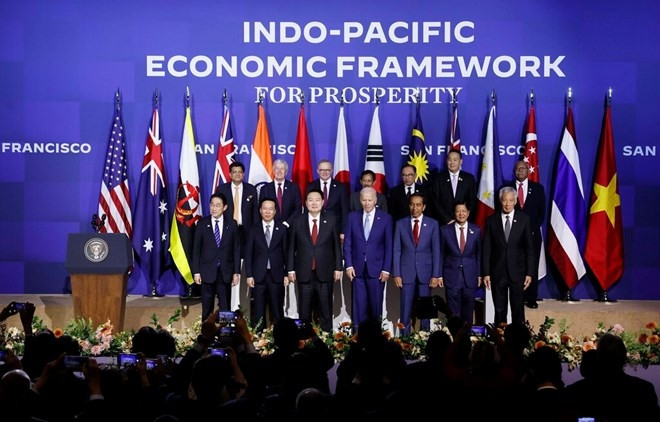

In his speech, Thuong noted that IPEF shows its member economies’ joint effort to strengthen cooperation and coordination amid the changing global landscape that presents both opportunities and challenges. The new organization is expected to be a dynamic and effective model of economic connection, bringing practical benefits for the people, and contributing to peace, stability and prosperity in the region and the wider world.
He acknowledged the ministers’ hard work to reach consensus on an important premise for cooperation, based on the principles of equality, mutual benefit, inclusiveness, compliance with international law, and respect for laws and political institutions of each member economy, while promoting flexibility and voluntariness.
In order to fully tap into the potential of IPEF and make its cooperation truly effective, the President said IPEF needs to be an open, inclusive, non-discriminatory cooperation mechanism that supports a rules-based multilateral trading system.
IPEP should welcome countries inside and outside the region as its members, and at the same time align with economic connectivity initiatives of other regions, he suggested.
According to the Vietnamese President, IPEF cooperation should meet development needs and interests of all parties, taking into account the differences and unique characteristics of each country, with a primary focus on technical support and capacity building.
He also called for new investment in infrastructure construction, clean energy conversion, and high-tech industrial production in the region.
The meeting bought together senior leaders of APEC economies, heads of government and state, and representatives of a number of countries, including the United States, India, Brunei, Indonesia, the Republic of Korea. China, New Zealand, Japan, Malaysia, Australia, Fiji, the Philippines, Thailand, Singapore and Vietnam.
The leaders agreed to established the IPEF climate fund and the IPEF catalytic capital fund, with an initial capital of about US$30 million, to support projects on clean economy transformation. They also discussed in detail the establishment of a number of specialized cooperation mechanisms such as the IPEF Investment Accelerator, the Critical Mineral Dialogue and the Clean Economy Investor Forum.
After the meeting, the leaders approved a joint statement on the Indo-Pacific Economic Framework for Prosperity.
The IPEF launched in May 2022 is comprised of 14 member countries, namely Australia, Brunei, Fiji, India, Indonesia, Japan, the Republic of Korea, Malaysia, New Zealand, the Philippines, Singapore, Thailand, Vietnam, and the US. The The IPEF nations account for 40% of the global GDP and 28% of the world’s commodities, services and trade.
Source: VOV